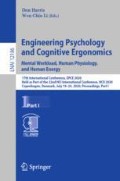Abstract
In this paper, the effects on human performance of thermal sensation were investigated. Recruited subjects performed Mackworth clock tests examining vigilance and cognitive performance. The results showed that thermal discomfort caused by elevated air temperature and clothes had a negative effect on performance. A quantitative relationship was established between thermal sensation votes and task performance. The relationship indicates that optimum performance can be achieved slightly below neutral (\( PMV_{best} = - 0.74 \) for group), while thermal discomfort (feeling too warm or too cold) leads to reduced performance. The big individual difference in \( PMV_{best} \) implies that occupants have different thermal requirements to keep high performance. Therefore, conventional heating and cooling approaches should work with individual microclimate control approaches to improve individual productivity. The findings can be used for economic calculations pertaining to building design and operation when occupant productivity is considered.
Access this chapter
Tax calculation will be finalised at checkout
Purchases are for personal use only
References
Roelofsen, P.: The impact of office environments on employee performance: the design of the workplace as a strategy for productivity enhancement. J. Facil. Manag. 1(3), 247–264 (2002)
Woods, J.E.: Cost avoidance and productivity in owning and operating buildings. Occup. Med. 4(4), 753–770 (1989)
Lorsch, H.G., Ossama, A.A.: The impact of the building indoor environment on occupant productivity-part 1: recent studies, measures, and costs. ASHRAE Trans. 100(2), 741–749 (1994)
Seppänen, O.A., Fisk, W.J., Mendell, M.J.: Association of ventilation rates and CO2- concentrations with health and other responses in commercial and institutional buildings. Indoor Air 9, 252–274 (1999)
Fang, L., Wyon, D.P., Clausen, G., Fanger, P.O.: Impact of indoor air temperature and humidity in an office on perceived air quality, SBS symptoms and performance. Indoor Air 14(Suppl. 7), 74–81 (2004)
Berglund, L., Gonzales, R., Gaffe, A.: Predicted human performance decrement from thermal discomfort and ET*. In: Proceedings of the Fifth International Conference on Indoor Air Quality and Climate, Toronto, vol. 1, pp. 215–220 (1990)
Niemela, R., Hannula, M., Rautio, S., Reijula, K., Railio, J.: The effect of indoor air temperature on labor on productivity in call centers-a case study. Energy Build. 34(7), 59–64 (2002)
Wyon, D.P., Fanger, P.O., Olesen, B.W., Pedersen, C.J.K.: The mental performance of subjects clothed for comfort at two different air temperatures 18, 358–374 (1975)
Loveday, D., Hanby, V.I., Woodward, W.B.: A software tool for relating the comfort and productivity of occupants in commercial buildings. In: Proceedings of CIBSE National Conference, pp. 69–75 (1995)
Roelofsen, P.: The design of the workplace as a strategy for productivity enhancement. In: Clima 2000/Napoli 2001 World Congress, Napoli (2001)
Jensen, K.L., Toftum, J., Friis-Hansen, P.: A Bayesian network approach to the evaluation of building design and its consequences for employee performance and operational costs. Build. Environ. 44, 456–462 (2009)
Kosonen, R., Tan, F.: Assessment of productivity loss in air-conditioned buildings using PMV index. Energy Build. 36, 987–993 (2004)
Seppänen, O., Fisk, W., Lei, Q.H.: Room temperature and productivity in office work. In: eScholarship Repository, Lawrence Berkeley National Laboratory, University of California (2006). http://repositories.cdlib.org/lbnl/LBNL-60952
Drury, C.G.: Managing the speed-accuracy trade-off. In: Karwowski, W., Marras, W. (eds.) The Occupational Ergonomics Handbook, 1st edn. CRC Press, New York (1999)
Wickelgren, W.A.: Speed-accuracy trade-off and information processing dynamics. Acta Psychologica 41(1), 67–85 (1977)
Lan, L.: Mechanism and evaluation of the effects of indoor environmental quality on human productivity. Ph.D. thesis, Shanghai Jiao Tong University (2010)
Lan, L., Wargocki, P., Lian, Z.: Quantitative measurement of productivity loss due to thermal discomfort. Energy Build. 43(5), 1057–1062 (2011)
Cui, W., Cao, G., Park, J.H., et al.: Influence of indoor air temperature on human thermal comfort, motivation and performance. Build. Environ. 68, 114–122 (2013)
Acknowledgements
This work was supported by the National Natural Science Foundation of China [grant number 51578305] and Beijing Municipal Natural Science Foundation [grant number 9172008].
Author information
Authors and Affiliations
Corresponding author
Editor information
Editors and Affiliations
Rights and permissions
Copyright information
© 2020 Springer Nature Switzerland AG
About this paper
Cite this paper
Fu, J., Yan, R., Wang, F., Ma, L. (2020). Relationship Between Thermal Sensation and Human Cognitive Performance Based on PMV. In: Harris, D., Li, WC. (eds) Engineering Psychology and Cognitive Ergonomics. Mental Workload, Human Physiology, and Human Energy. HCII 2020. Lecture Notes in Computer Science(), vol 12186. Springer, Cham. https://doi.org/10.1007/978-3-030-49044-7_4
Download citation
DOI: https://doi.org/10.1007/978-3-030-49044-7_4
Published:
Publisher Name: Springer, Cham
Print ISBN: 978-3-030-49043-0
Online ISBN: 978-3-030-49044-7
eBook Packages: Computer ScienceComputer Science (R0)

